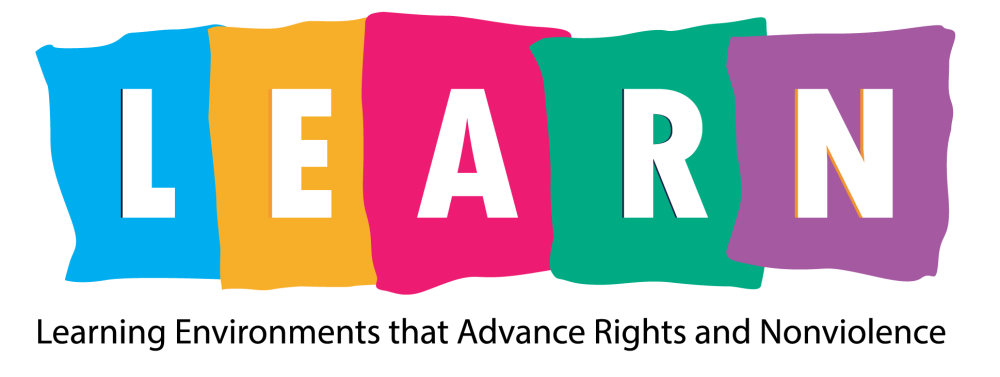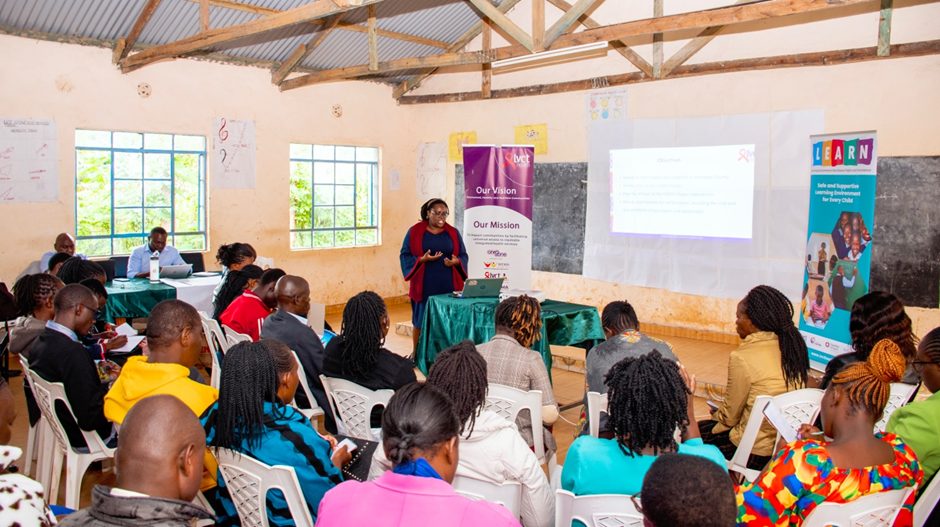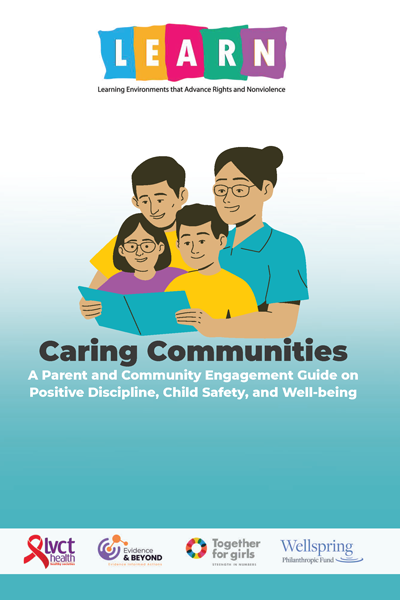Region: Kiambu and Homa Bay (select wards)
Partners: LVCT Health and Evidence and Beyond, in collaboration with the Kenya Ministry of Education and Teachers Service Commission
Project Duration: 2023-2026
Funders: Together for Girls and Wellsprings Philanthropic Fund
Contact Information: Anne Ngunjiri: Anne.Ngunjiri@lvcthealth.org

Corporal punishment is still widely used in Kenyan schools despite being banned by the government in 2001. Children continue to face caning, slapping, and humiliation, which harms their mental health, lowers academic performance, and perpetuates cycles of violence. Teachers often lack training in positive alternatives and children are rarely aware of their rights, leaving them unprotected.
The LEARN (Learning Environments that Advance Rights and Nonviolence) project was developed to change this. It equips learners with life skills to recognise and resist violence, trains teachers in non-violent discipline, supports school leaders to embed safe school policies, and engages caregivers to reinforce positive practices at home. By addressing these four levels together, LEARN aims to reduce corporal punishment and create safer, more inclusive schools where children can thrive.
Our Theory of Change
LEARN is built on the understanding that ending corporal punishment requires coordinated change across the entire school ecosystem. By empowering learners with knowledge and voice, equipping teachers with practical, non-violent strategies, supporting school leaders to embed a culture of care, and engaging caregivers in positive parenting, LEARN helps schools shift daily routines and relationships. These changes reinforce each other to make safety and respect the norm in every classroom.
Explore our LEARN Toolkit: A Whole-School Approach to Ending Corporal Punishment in Kenya
The LEARN Toolkit is a structured, school-based programme designed to end corporal punishment and create safer, more inclusive learning environments in Kenyan primary schools. It uses a whole-school approach, engaging learners, teachers, school leaders, and caregivers to replace violence with positive discipline, child protection, and social-emotional learning.
Learners: Children in Grades 3 to 6 use the illustrated Heroes in the Making workbook in 18 sessions on rights, safety, managing emotions, conflict resolution, and friendships, with quick activities and guided discussion in class and short take-home reflections to strengthen empathy, communication, and help-seeking across school and home. In addition, learners bring home reflection activities from their workbooks, sparking conversations around emotions, safety, and positive behaviour. This ensures that children experience consistent messages and support between school and home.
Teachers use a facilitation guide to deliver lessons in class, while learners also complete take-home tasks with their caregivers. This three-way approach helps children practice empathy, self-expression, and help-seeking across school, home, and peer settings.
Positive Discipline Approaches for Teachers
Teachers take part in structured training and ongoing mentorship to replace corporal punishment with constructive alternatives. They attend a four-day orientation, followed by continuous support through peer learning groups and digital microlearning forums. Using a detailed facilitator manual and personal reflection journals, teachers learn to apply positive discipline strategies, manage stress, and foster safe, inclusive classrooms. Teachers will receive ongoing coaching through self-reflection logs, school-based, teacher-led peer groups and termly reflection circles.
My Caring Classroom Companion guides practical reflection from day one and links to monthly self-reflection logs so teachers track progress, manage stress, and embed positive discipline in daily routines.
In addition, teachers and educators will be supported through term time digital microlearning that delivers prompts, concise lessons, reflective questions and ready to use tip sheets aligned to LEARN modules, with space for peer exchange, ongoing mentorship and quick problem solving; participation is open to all trained staff and organised by school for relevance.

Positive Parenting & Community Engagement for Safe Schools
Parents and caregivers are engaged through short, structured sessions during PTA forums and community events, using a practical facilitation guide. Themes include understanding children’s rights, safe and supportive parenting, and alternatives to harsh discipline.
Safe School Leadership for Positive Discipline
Headteachers, Deputies, and Board of Management members are oriented on how to integrate LEARN into school routines, timetables, and governance processes. They use simple accountability tools to monitor progress on safeguarding, teacher support, and life-skills delivery. Reflection circles each term allow leaders to share experiences, problem-solve, and strengthen collective responsibility for child protection and school safety.
The LEARN Toolkit is implemented with supportive supervision and mentorship. A robust Monitoring, Evaluation, and Learning framework tracks implementation fidelity and changes in knowledge, attitudes, and practices among learners, teachers, leaders, and caregivers. Findings will inform policy, improve programme delivery, and support the scale-up of violence prevention efforts.
A snapshot of our reach and impact
1130+Number of parents reached of primary school learners in the project focus counties |
162+Number of teachers, Head of Institutions and BoM reps reached with LEARN interventions |
70+Number of education stakeholders county and national level engaged |
Featured News and Blogs

Over 80 teachers in Kasimba and Gachororo Primary Schools embraced new approaches to child protection and positive discipline during four-day trainings led by LVCT Health. Through honest reflection and practical skills-building, teachers are reshaping classrooms into spaces of respect, safety, and growth. Read how educators are leading change in schools

In a significant move towards creating safer and more nurturing learning environments, stakeholders from across the education sector gathered to launch a new initiative aimed at ending corporal punishment in schools in the region.

National Education Leaders Affirm Commitment to Safer Schools
Related Publications
Kenya’s Bogotá Pledge on safe and enabling schools commits to train 100,000 school staff, expand psychosocial support, and make positive discipline the norm in safe, enabling schools by 2030.
Kenya’s National Prevention and Response Plan on Violence Against Children sets Education and Life Skills as a core pillar, alling for life skills, safe schools, and teacher capacity to replace corporal punishment with guidance and counselling.
Watch our featured video
How to Get Involved
We partner with universities and research institutes and host students and researchers on live projects to build skills and deliver impact. We also offer technical assistance to ministries, NGOs, and school networks to design, adapt, and evaluate school based prevention and life skills programmes aligned child protection standards.





